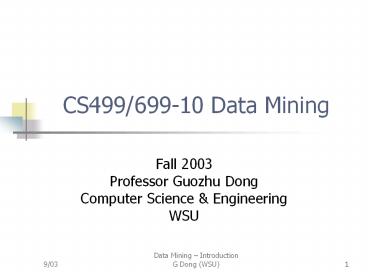Data Mining - PowerPoint PPT Presentation
Title:
Data Mining
Description:
Title: CSE591 Data Mining Last modified by: Lijun Created Date: 9/30/1996 6:28:10 PM Document presentation format: On-screen Show Other titles: Times New Roman Tahoma ... – PowerPoint PPT presentation
Number of Views:52
Avg rating:3.0/5.0
Title: Data Mining
1
CS499/699-10 Data Mining
- Fall 2003
- Professor Guozhu Dong
- Computer Science Engineering
- WSU
2
Introduction
- Introduction to this Course
- Introduction to Data Mining
3
Introduction to the Course
- First, about you - why take this course?
- Your background and strength
- AI, DBMS, Statistics, Biology, Business,
- Your interests and requests
- What is this course about?
- Problem solving
- Handling data
- transform data to workable data
- Mining data
- turn data to knowledge
- validation and presentation of knowledge
4
This course
- What can you expect from this course?
- Knowledge and experience about DM
- Problem solving skills
- How is this course conducted?
- Home works, projects, exams, classes
- Course Format
- Individual Projects 30
- Exams and/or quizzes 60
- Homeworks 10
5
Course Web Site
- cs.wright.edu/gdong/mining03/WSUCS499DataMining.h
tm - My office and office hours
- RC 430
- 430-530, T Th
- My email gdong_at_cs.wright.edu
- Slides and relevant information will be made
available at the course web site
6
Any questions and suggestions?
- Your feedback is most welcome!
- I need it to adapt the course to your needs.
- Please feel free to provide yours anytime.
- Share your questions and concerns with the class
very likely others may have the same. - No pain no gain no magic for data mining.
- The more you put in, the more you get
- Your grades are proportional to your efforts.
7
Introduction to Data Mining
- Definitions
- Motivations of DM
- Interdisciplinary Links of DM
8
What is DM?
- Or more precisely KDD (knowledge discovery from
databases)? - Many definitions
- An iterative process, not plug-and-play
- raw data ? transformed data ? preprocessed data ?
data mining ? post-processing ? knowledge - One definition is
- A non-trivial process of identifying valid,
novel, useful and ultimately understandable
patterns in data
9
Need for Data Mining
- Data accumulate and double every 9 months
- There is a big gap from stored data to knowledge
and the transition wont occur automatically. - Manual data analysis is not new but a bottleneck
- Fast developing Computer Science and Engineering
generates new demands - Seeking knowledge from massive data
- Any personal experience?
10
When is DM useful
- Data rich world
- Large data (dimensionality and size)
- Image data (size)
- Gene chip data (dimensionality)
- Little knowledge about data (exploratory data
analysis) - What if we have some knowledge?
11
DM perspectives
- KDD goals Prediction, description,
explanation, optimization, and exploration - Knowledge forms patterns vs. models
- Understandability and representation of knowledge
- Some applications
- Business intelligence (CRM)
- Security (Info, Comp Systems, Networks, Data,
Privacy) - Scientific discovery (bioinformatics, medicine)
12
Challenges
- Increasing data dimensionality and data size
- Various data forms
- New data types
- Streaming data, multimedia data
- Efficient search and access to data/knowledge
- Intelligent update and integration
13
Interdisciplinary Links of DM
- Statistics
- Databases
- AI
- Machine Learning
- Visualization
- High Performance Computing
- supercomputers, distributed/parallel/cluster
computing
14
Statistics
- Discovery of structures or patterns in data sets
- hypothesis testing, parameter estimation
- Optimal strategies for collecting data
- efficient search of large databases
- Static data
- constantly evolving data
- Models play a central role
- algorithms are of a major concern
- patterns are sought
15
Relational Databases
- A relational database can contain several tables
- Tables and schemas
- The goal in data organization is to maintain data
and quickly locate the requested data - Queries and index structures
- Query execution and optimization
- Query optimization is to find the best possible
evaluation method for a given query - Providing fast, reliable access to data for data
mining
16
AI
- Intelligent agents
- Perception-Action-Goal-Environment
- Search
- Uniform cost and informed search algorithms
- Knowledge representation
- FOL, production rules, frames with semantic
networks - Knowledge acquisition
- Knowledge maintenance and application
17
Machine Learning
- Focusing on complex representations,
data-intensive problems, and search-based methods - Flexibility with prior knowledge and collected
data - Generalization from data and empirical validation
- statistical soundness and computational
efficiency - constrained by finite computing data resources
- Challenges from KDD
- scaling up, cost info, auto data preprocessing,
more knowledge types
18
Visualization
- Producing a visual display with insights into the
structure of the data with interactive means - zoom in/out, rotating, displaying detailed info
- Various types of visualization methods
- show summary properties and explore relationships
between variables - investigate large DBs and convey lots of
information - analyze data with geographic/spatial location
- A pre- and post-processing tool for KDD
19
Bibliography
- J. Han and M. Kamber. Data Mining Concepts and
Techniques. 2001. Morgan Kaufmann. - D. Hand, H. Mannila, P. Smyth. Principals of Data
Mining. 2001. MIT. - W. Klosgen J.M. Zytkow, edited, 2001, Handbook
of Data Mining and Knowledge Discovery.































